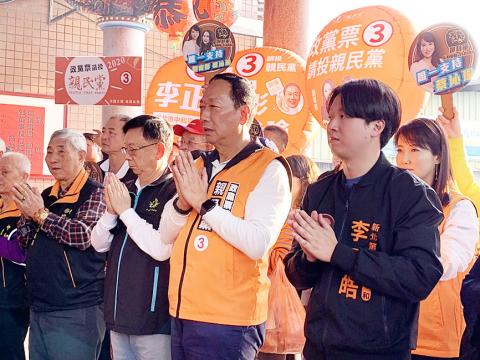Hon Hai Precision Industry Co founder Terry Gou (郭台銘) is not asking people to ditch the Taiwan People’s Party (TPP) to help the People First Party (PFP) become the third-largest party in the Legislative Yuan, PFP legislator-at-large candidate Amanda Liu (劉宥彤) said yesterday, adding that Gou’s team aims to maximize the power of third parties.
“Gou clearly stated on Sunday that pan-green camp voters could consider voting for the TPP in the party ballot if they cannot support the Democratic Progressive Party (DPP) this time,” said Liu, who was a spokeswoman for Gou while he was contesting the Chinese Nationalist Party’s (KMT) presidential primary.
“He also called for support for the PFP from pan-blue camp voters if they are disappointed by the KMT’s performance,” she said.

Photo: CNA
“For moderate voters fearing that the DPP would seize an absolute majority in the Legislative Yuan again, he said that they should really consider supporting the PFP,” Liu said. “I believe he would maintain this position for election day.”
Liu made the statement before joining other PFP candidates to canvass for votes from campaign vehicles.
Despite failing to secure the KMT’s nomination, Gou continued to exert his influence on politics in Taiwan by having aides enter legislative races and supporting candidates of other parties who have aligned themselves with Gou’s camp.
Evelyn Tsai (蔡沁瑜) and Ann Kao (高虹安), also former Gou aides, are legislator-at-large candidates for the PFP and the TPP respectively.
Gou would try everything to help the PFP garner more party votes, from recording mobilization messages for robocalls to canvassing for votes on the streets, Liu said, adding that they would step up campaign efforts in Taipei and New Taipei City to show that the PFP is the party that can counterbalance the KMT and the DPP.
The principle that governs the strategy of Gou’s team is to maximize the force of third parties in the Legislative Yuan, she said, adding that Gou would spend more time campaigning for the PFP, because it needs to work harder to secure more votes from moderate voters who lean toward the pan-blue camp.
Gou’s team and the PFP would further integrate campaign resources in the days remaining before the elections, so voters would see a different PFP, she said.
Gou’s team and the TPP have jointly nominated Richie Lee (李縉穎) to contest the legislative seat for New Taipei City’s Tucheng (土城) and Sansia (三峽) districts, and the team and the PFP worked to nominate former KMT Youth League secretary-general Lee Zheng-hao (李正皓) to run in New Taipei City’s Jhonghe District (中和).
The two Lees are perfect examples of maximizing the power of third parties by combining the PFP, the TPP and independent candidates, Liu said, adding that they would help fulfill Gou’s promise to build a high-tech corridor in northern Taiwan.
PFP vice presidential candidate Sandra Yu (余湘) said that Gou’s robocall message would boost votes for the party, as he has a lot of supporters.
PFP Chairman James Soong (宋楚瑜), its presidential candidate, and Yu started canvassing votes nationwide yesterday, the party said.
“Our experience from contacting voters in person is that approximately 20 percent of people have yet to decide how they are going to vote,” PFP Department of Mobilization Director Chang Sho-wen (張碩文) said. “They are generally young and remain undecided because they dislike Kaohsiung Mayor Han Kuo-yu (韓國瑜) [the KMT’s presidential candidate] and are disappointed with the DPP government.”

An essay competition jointly organized by a local writing society and a publisher affiliated with the Chinese Communist Party (CCP) might have contravened the Act Governing Relations Between the People of the Taiwan Area and the Mainland Area (臺灣地區與大陸地區人民關係條例), the Mainland Affairs Council (MAC) said on Thursday. “In this case, the partner organization is clearly an agency under the CCP’s Fujian Provincial Committee,” MAC Deputy Minister and spokesperson Liang Wen-chieh (梁文傑) said at a news briefing in Taipei. “It also involves bringing Taiwanese students to China with all-expenses-paid arrangements to attend award ceremonies and camps,” Liang said. Those two “characteristics” are typically sufficient

A magnitude 5.9 earthquake that struck about 33km off the coast of Hualien City was the "main shock" in a series of quakes in the area, with aftershocks expected over the next three days, the Central Weather Administration (CWA) said yesterday. Prior to the magnitude 5.9 quake shaking most of Taiwan at 6:53pm yesterday, six other earthquakes stronger than a magnitude of 4, starting with a magnitude 5.5 quake at 6:09pm, occurred in the area. CWA Seismological Center Director Wu Chien-fu (吳健富) confirmed that the quakes were all part of the same series and that the magnitude 5.5 temblor was

The brilliant blue waters, thick foliage and bucolic atmosphere on this seemingly idyllic archipelago deep in the Pacific Ocean belie the key role it now plays in a titanic geopolitical struggle. Palau is again on the front line as China, and the US and its allies prepare their forces in an intensifying contest for control over the Asia-Pacific region. The democratic nation of just 17,000 people hosts US-controlled airstrips and soon-to-be-completed radar installations that the US military describes as “critical” to monitoring vast swathes of water and airspace. It is also a key piece of the second island chain, a string of

The Central Weather Administration has issued a heat alert for southeastern Taiwan, warning of temperatures as high as 36°C today, while alerting some coastal areas of strong winds later in the day. Kaohsiung’s Neimen District (內門) and Pingtung County’s Neipu Township (內埔) are under an orange heat alert, which warns of temperatures as high as 36°C for three consecutive days, the CWA said, citing southwest winds. The heat would also extend to Tainan’s Nansi (楠西) and Yujing (玉井) districts, as well as Pingtung’s Gaoshu (高樹), Yanpu (鹽埔) and Majia (瑪家) townships, it said, forecasting highs of up to 36°C in those areas